When it comes to betting on historic breakthroughs in the Middle East, it’s far from true that the (White) House always wins, writes Shalom Lipner. If history is any guide, it might not be long after President Trump’s trip to the region before everybody reverts back to their default positions, leaving scant reminder of any seeds of optimism. This piece originally appeared in The American Interest.
With the Middle East in his rearview mirror, President Donald Trump can be reasonably satisfied. The first leg of his international debut passed without major incident—no small feat given Trump’s penchant for improvisation. As an added bonus, the colorful images of his “I Am Not Barack Obama” tour booted less flattering accounts of his presidency from the headlines for a short while.
The locals were no less pleased. Proclaiming their friendship for the United States under banners like Together We Prevail and Even Stronger, Saudis and Israelis pulled out the stops to welcome Trump. They may not have gotten every last thing they hoped for, but that didn’t stop them from celebrating the return of that lovin’ feeling whose loss they mourned bitterly under the previous administration. Trump’s unprecedented visit to the Western Wall—the first by a sitting U.S. President—and his Israel Museum paean to Zionism allayed Israeli disappointment over his expected signature of a waiver shelving (at least for now) the relocation of the American embassy to Jerusalem. And any discomfort caused to Trump’s Saudi hosts by his challenge to confront “the crisis of Islamist extremism” was no doubt offset by the prospect of acquiring $350 billion in U.S. arms over the next ten years.
But from my experience, uplifting rhetoric and memorable optics are the easy part. When it comes to betting on historic breakthroughs in the Middle East, it’s far from true that the (White) House always wins. If history is any guide, it might not be long before everybody reverts back to their default positions, leaving scant reminder of any seeds of optimism. So, aside from Riyadh’s positive contribution to America’s balance of payments, what else can we anticipate?
Iran leads the regional hit parade. Opposition to the regime in Tehran—particularly its nuclear aspirations—remains the catalyst for all the cheerful talk of all the “rare opportunities” that await us. Israel, Saudi Arabia, and its Persian Gulf neighbors couldn’t agree more with Trump’s diagnosis that the Iranians “negotiated a fantastic deal with the last administration” and were heartened by his declaration that “Iran will never have nuclear weapons.”
Critics of President Obama chastised him regularly for confusing soaring speeches with actual policy and action. Now the onus lies on Trump to make good on his promise to block Iran from acquiring nuclear arms. Just last week, in compliance with the very deal he scorned, Trump suspended sanctions against Iran. In parallel, new U.S. Treasury designations targeted persons and entities involved in Iran’s ballistic missile program, and the State Department issued its semi-annual dossier on human rights abuses in the country. Secretary of State Rex Tillerson confirmed in April that the administration is conducting an “interagency review” of the Joint Comprehensive Plan of Action, but what happens next is anybody’s guess.
Trump could initiate a new round of crippling sanctions against Iran, but getting a skeptical international community back on board—as it gorges itself on Iranian business contracts and swoons over the reelection of President Hassan Rouhani—may prove impossible. Is Trump prepared to draw that sword he brandished in Saudi Arabia or to support military action by American allies? Or is he forecasting some change of heart that will prompt Iran to unilaterally disavow its hopes of a nuclear option? Time will tell.
On a second front, Trump has turned heads with his zeal to do what he’s repeatedly called the “ultimate deal” between Israel and the Palestinians within the next year. Talking up his interest in reconciling the two sides, and even invoking the name of Saudi King Salman as one who “would love to see peace” between them, Trump pledged a “renewed effort” to broker an agreement. His senior advisor, son-in-law Jared Kushner, has been put in charge of the portfolio and his envoy, former Trump Organization Executive Vice President Jason Greenblatt, has been traversing the region and winning praise for engaging thoughtfully with all relevant constituencies.
Whether Israelis and Palestinians trust that Trump is sincere or whether they just fear the wrath of a scorned President is unclear. The answer is probably a bit of both. For now, however, they appear to be along for the ride, fearful of being blamed for the failure of any process. But their fundamental positions have undergone little transformation and there’s little reason to believe that Israel’s maximum offer will suddenly placate the minimum demands of the Palestinians. Israel has always been reluctant to take risks when it felt that the United States did not have its back, but even the highest level of confidence in America’s friendship offers no guarantee that the Israeli government will step outside its comfort zone. One can be forgiven for wondering if an ambitious Trump can change this dynamic.
A more likely scenario is that Israelis and Palestinians return to bickering over their more parochial concerns and grievances. Prime Minister Benjamin Netanyahu will continue to hammer the Palestinian Authority over its financial compensation of convicted killers and sanctioned incitement against Israelis and Jews. Rejecting President Mahmoud Abbas as a serious partner for peace under these circumstances, Israel will reflexively deflect attention to Iran—a message Trump has already absorbed—and hope to translate Trump’s affirmation of the “unbreakable bond between the United States and the State of Israel” into tangible measures. Abbas will parry by conditioning talks with Israel on his perennial demands for a settlement freeze and the release of Palestinian prisoners from Israeli jails. In other words, business as usual—unless Trump can produce enough aces from up his sleeve.
Finally, resurrecting the proverbial war against terror, Trump broke new semantic ground when he specified “Islamist” extremism and terror as crises requiring intervention. (Delivering his actual remarks, the President appeared to say “Islamic,” but official transcripts now say “Islamist,” and officials stress that the latter was the intended word.) Exhorting attendees of the Arab-Islamic-American Summit to “drive out” the culprits, he struck a raw nerve for the Sunni world which birthed ISIS and the Taliban. Taking up the gauntlet, the Saudis used the backdrop of Trump’s visit to the kingdom to inaugurate the new Global Center for Combating Extremist Ideology, home of the now infamous glowing orb. The pace of progress in its mission remains, however, uncertain.
When it comes to spreading the flames of radicalism, Saudi leaders stand accused of acting as “both the arsonists and the firefighters.” By bankrolling the propagation of Wahhabi Islam around the world, they have been playing with fire. Feeling the heat on their doorstep in places like Syria and Yemen, Sunni monarchs have since resolved to step up their anti-terror game. But even with the advent of the Arab Spring—a misnomer if ever there were one—the dance of reform in the Arab world has been a familiar two steps forward, one step back.
The royals are heavily vested in the current framework, which has kept them ensconced in power, governing societies plagued by stagnation and income inequality. Part of that infrastructure—whether from fealty to religious dictum or out of need to tamp down public agitation—has been the clerical system. If combatting terror now means driving its perpetrators from the mosque, as Trump advised, it remains to be seen how far and how fast his Arab allies are willing to go down this road. The fact that the stakes are high does not ensure his success.
Progress has been elusive in each of these three theaters. Greenblatt is already back in the region meeting with Israelis and Palestinians, but plenty of spoilers are already laying plans to derail Trump’s vision. An even bigger wild card is Trump himself. Once he gets back to Washington, his Middle East junket will start to seem like a distant memory. Does he possess the gravitas, capability, commitment, creativity, and political bandwidth to see through what he launched? If he doesn’t, no measure of good intention will get him across the finish line.
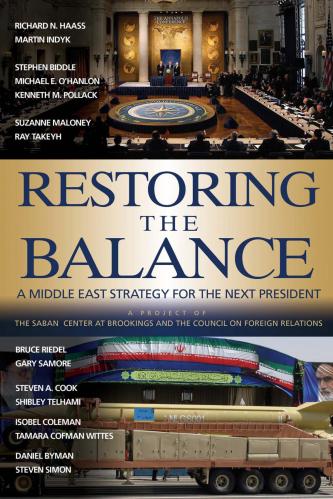
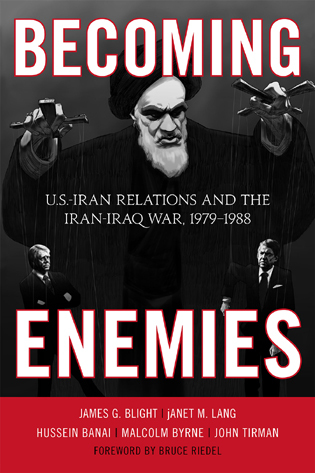


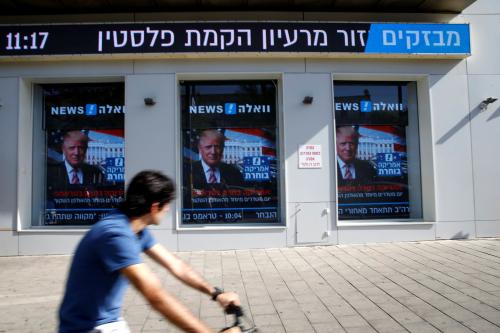
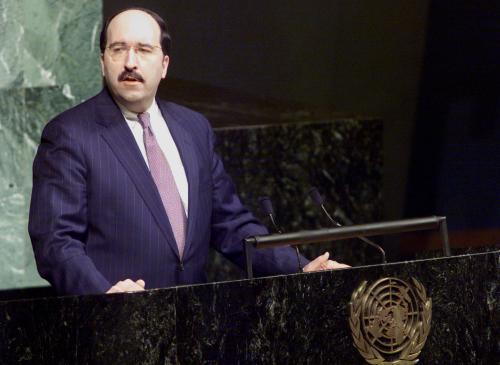
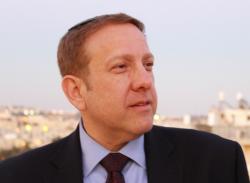


Commentary
After his overseas trip, Trump shouldn’t rush to pop champagne corks
May 29, 2017